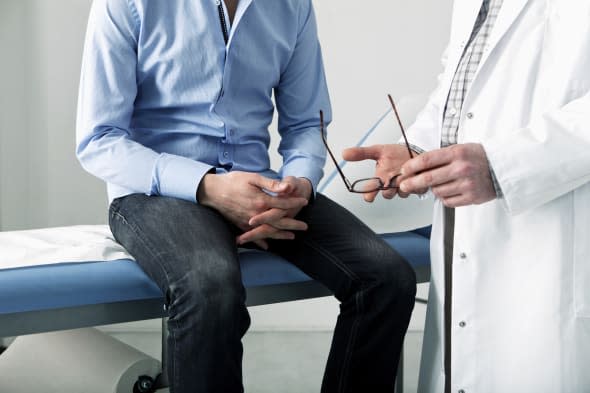Prostate cancer: What you need to know

Prostate cancer is now the most common cancer amongst British men, with more than 40,000 cases diagnosed each year. Yet research has shown that men are significantly less likely to report ill health than women, and since cancer treatment is typically more effective if diagnosed at the early stages, this reluctance to see a doctor can be a problem. If that sounds like you or someone you know, then here are the symptoms you need to watch out for.
Related Searches
Causes
What causes prostate cancer still remains a mystery, but there are factors known to increase your risk. The chances of developing the disease increase as you age, with the majority of cases diagnosed in men over the age of 50. It is also more common in those of African-Caribbean or African descent, and in those who have immediate relatives that have been affected.
Symptoms
Unfortunately, prostate cancer usually develops slowly and displays no symptoms for some years. In general, you'll only notice a problem when the prostate is large enough to affect the urethra, which can lead to an increased need to urinate, often during the night, straining while urinating or having trouble getting started, and a feeling that your bladder has not fully emptied. Though these symptoms don't necessarily mean you've got prostate cancer, you shouldn't dismiss them, but visit your doctor just to be on the safe side.
Diagnosis
Initial testing for prostate cancer is fairly simple. Your doctor will typically use a blood test to check for an elevated level of prostate-specific antigen (PSA), and a digital rectal examination, which, while uncomfortable, should be a quick and painless procedure. Blood tests are not always offered, as an increased level of PSA may not be specific to prostate cancer, but you can ask to be tested. A urine test may also be required in order to rule out infection as the cause of the symptoms. Should your doctor find something to be concerned about during these initial tests, you may be referred for a biopsy to provide a more reliable assessment.
Treatment
Since prostate cancer is a slow-growing disease, if caught at an early stage, you may not need immediate treatment. Instead, your specialist may advise a 'watch and wait' strategy where the situation is carefully monitored. Where treatment is required, provided the cancer has been diagnosed at an early stage, surgery to remove the prostate, and possibly radiotherapy or hormone therapy may be prescribed as a course of action. These treatments can cause side effects such as erectile dysfunction and urinary incontinence. As long as the cancer has not spread, the survival rates for prostate cancer are good. 2010 to 2011 figures show that 84 per cent of men were expected to live for ten years or more.
%VIRTUAL-AFCSponserAds%
Prevention
Though the cause of prostate cancer is still unknown, research has shown that lifestyle factors may increase the risk. According to Prostate Cancer UK, soy foods, green tea, cruciferous vegetables and foods containing lycopene (such as tomatoes) or selenium (found in Brazil nuts, fish, liver and kidney) may have a protective effect. On the flip side, a diet high in dairy, processed and red meat, saturated fat and alcohol may increase the risk, so a healthy balanced diet is advised. In line with this potential factor, obese men have been found to suffer more often than men who keep fit, so maintaining a healthy weight and getting regular exercise are also important for reducing your risk. The more you do, and the more vigorous it is, the lower your chances of developing prostate cancer, but even increasing the amount a little can make a big difference.
Remember, the key to treating prostate cancer is to catch the disease early - so if you have noticed any unusual symptoms, don't dismiss them. Visit your doctor and get checked.
Have you been diagnosed or treated for prostate cancer? What advice would you give to men reluctant to visit their doctor? Leave your comments below...




